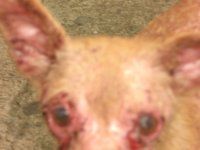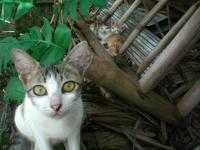Source: www.pet-grub.com
If you wish to quickly print this entire book with the greatest of ease, please read the following page:
Are Antibiotics Really Needed After Surgery?
Sponsored Links
Are antibiotics really needed after surgery?
Although antibiotics are provided for our pets after they go through surgery, some holistic vets are suggesting that antibiotics are not needed. I then asked my Chinese herbalist along with a naturopath for their views and they echoed the same thoughts.
So, when I had my cats spayed, I never used any antibiotics after their surgery. The theory is that if the vet does the surgery properly, then internally where the surgery took place, it is completely sterile. As a result, once the wound is stitched up, internally there cannot be any infections.
Realizing this, some holistic vets are suggesting that all we need to do is keep the wound clean and sterile.
With my two cats, I simply use an iodine solution topically along with homeopathic Traumeel tablets.
In fact, I gave homeopathic Traumeel tablets for one week prior to their surgery. I simply added some Traumeel tablets to their drinking water. Taking the Traumeel tablets prior to surgery helps to prepare their body for the shock
or trauma
of the surgery to come. Then, immediately after surgery once the cats got home, I provided my cats with some homeopathic Traumeel, which I dissolved in some water on a plastic spoon. The reason why I used a plastic spoon is because I then spooned the dissolved homeopathic Traumeel tablets into my cat's mouth. So, by using a plastic spoon I don't have to worry about hitting their teeth. Initially, I gave them 4 dissolved tablets immediately. After that, I kept spooning 1 dissolved homeopathic Traumeel tablet into their mouth every hour while they were awake. However, if my cats drank water with the homeopathic Traumeel tablets dissolved in it, then I did not spoon the dissolved Traumeel tablets into their mouth because there was no need.
In addition to Traumeel tablets there is also a Traumeel ointment and/or a Traumeel cream. Both the ointment and cream should not be applied to an open wound. Once the wound has healed, then the Traumeel ointment or cream can be applied topically to help reduce scarring, faster healing, etc.
Although Traumeel ointment and cream should not be applied directly over the wound until it has healed, you can apply the ointment or cream around the wound. In my situation, I applied the cream over the stomach to the left and right of the wound.
Providing homeopathic Traumeel tablets is also said to help stimulate the body's own natural ability to kill or help protect the body against infections. This is not to be considered an antibiotic by any means. Instead, Traumeel helps to stimulate the body's own ability to heal itself.
With my cats, I had them spayed in the Philippines where I live most of the year. In the Philippines, dare I say, the veterinarians are not as competent — or at least I don't have as much confidence in them. In fact, I had to take one of my cats back to the vet three times due to the fact that the stitches came undone.
Luckily, because I had given the homeopathic Traumeel tablets prior to surgery, after the surgery and also because I was feeding my cats a wholesome raw meat diet, the body healed really quick and solid. So even though the stitches started to come undone by the third day after the surgery, there was enough healing done internally that the guts did not pop out.
At first, with my cat, it was just one stitch that came undone. But by the time I got my cat to the vet, all of the stitches had come undone. It was, shall we say, not a fun experience and this happened three times until the stitches were done in a way that the skin was finally able to heal.
This was the only time I have ever experienced stitches coming undone like this.
Although the Philippines is a hot, humid and essentially a dusty country, I never had any problems with infections even though I never used the antibiotics and even with the stitches coming undone three times.
Whether or not you use antibiotics post surgery is a personal choice. Of course, there are many disadvantages to using antibiotics, many potential side effects and many ways in which antibiotics can do damage to the health of your pets. But you must feel comfortable not using antibiotics and ideally, it should be done in consultation with a holistic vet.
Some Thoughts To Help Dogs and Cats Heal Faster Post Surgery
It doesn't hurt to train your pets to feel comfortable when being in a cage. When one pet is sick or had surgery, you can always take a second pet, put the second pet in the cage and then place the cages side–by–side or face–to–face to help the sick pet stay calm. This way, the sick pet doesn't feel as frustrated that it can't move like the other pets in the house. I did this with my cats. It's not that you keep the healthy pet in the cage all the time, but just to help calm the sick pet so it rests.
After surgery, you might find it better to feed ground meats rather than meat chunks. With Tiger, my cat that had the stitches come undone, I was feeding her ground meat initially. It was when I switched to meat chunks on day three that the stitches came undone. While in theory, whether you feed meat chunks or ground meat should not make a difference as long as the stitches are properly done. So although I cannot say whether or not meat chunks was the cause of the stitches coming undone or not, it doesn't hurt to feed ground meat until the skin has fully closed.
It can be difficult to keep your pets resting after surgery, especially when they are healthy and strong. It's even more difficult with a cat who likes to jump. While I once again cannot say whether Tiger was too active post surgery, I nonetheless was forced to place her in a room — much to her dislike — to keep her as inactive as possible. I ended up putting Tiger in a room with no furniture along with nothing else so Tiger could not jump. She obviously was not happy being in the room but for the first two to four days after surgery, this is something that can help the body heal faster.
In more extreme cases you will need to keep the pet in a cage while the body heals. But having the pet in a room with no furniture or anything to jump onto or down from is better. The room itself is like a giant cage while still allowing the dog or cat to have a little more freedom.
Of course, your pet might get cage fever
, similar to cabin fever
, if you keep your pet in the cage all the time. So you want to let your pet out of the cage so it can go to the washroom, drink, eat plus feel it can walk around the house. But do be careful that your pet doesn't get too active.
Pets eating a wholesome diet tend to heal faster than pets not eating a wholesome diet. Using Traumeel helps the pet heal even faster. But just remember, that your pet may begin to heal so good so fast that it will want to be more active than what it should be until the healing is completely finished.
The Body Heals From Inside Out
According to Hering's Law of Healing, the body heals from inside out. This means, after surgery, that your pet will heal internally first — healing the organ or part of the body that was surgically worked on is the first priority for the body. Then from there, the body starts to work its way outward healing the muscles, etc until finally the skin is healed.
Since the skin is not crucial for living, the body heals the skin last. This is why, even though in my situation, when the stitches came undone, enough healing was done internally to prevent the guts from popping out.
Antibiotic Alternatives
Whether you use antibiotics after surgery or not is a personal choice. Traditionally, there are a few natural alternatives to antibiotics. First, I used Traumeel tablets along with an iodine solution topically. But others have used bee propolis, garlic juice (externally), oil of tamanu and even honey. I personally did not use honey in the Philippines because there are just too many ants — but there is lots of information available on how honey has been used topically for its natural antibiotic properties.
Of all the natural antibiotics, one of the easiest to give is colloidal silver. I only use colloidal silver when needed. Colloidal silver can be given one week prior to the surgery and then continue to give for one more week after surgery. You can also apply colloidal silver topically on a wound too. Colloidal silver is said to kill over 650 harmful bacterias, viruses, fungi, parasites and molds.
When I had my cats spayed, I didn't have access to a source of colloidal silver and my cats were still fine. However, if I had access, I would have used the colloidal silver for sure.
You can add colloidal silver to the drinking water, add it to the food or simply spoon directly into the mouth.
Thoughts About Cats
After the stitches came undone, I also consulted with a holistic vet. The holistic vet told me a few interesting stories.
First, the holistic vet told me that the joke in orthopedic surgery is that if the cat has a broken bone, then as long as the bones are in the same room, they will heal.
The holistic vet told me that cats tend to have really good healing abilities even when the wounds are huge and large. The holistic vet further told me that once he had a cat that had a fan injury from under a car hood that lacerated the whole underside wide open. The wound was too dirty to suture yet over a few months, the wound healed so well that you could hardly tell it had a wound at all. After that experience, the holistic vet told me that he was fairly laid back when it came to cats and wounds. This of course doesn't mean you don't address issues, it just means that with cats, you can worry less, relax more.
Essentially, cats are amazing wound healers.
Learn More About Holistic Health and Nutrition For Pets
Keep reading by choosing another page or topic.
Ultimately, the best vaccination to prevent rabies or any health problem is a healthy pet — good health always begins with a good diet.
 Meet Jumbo, the participant in
Meet Jumbo, the participant in 